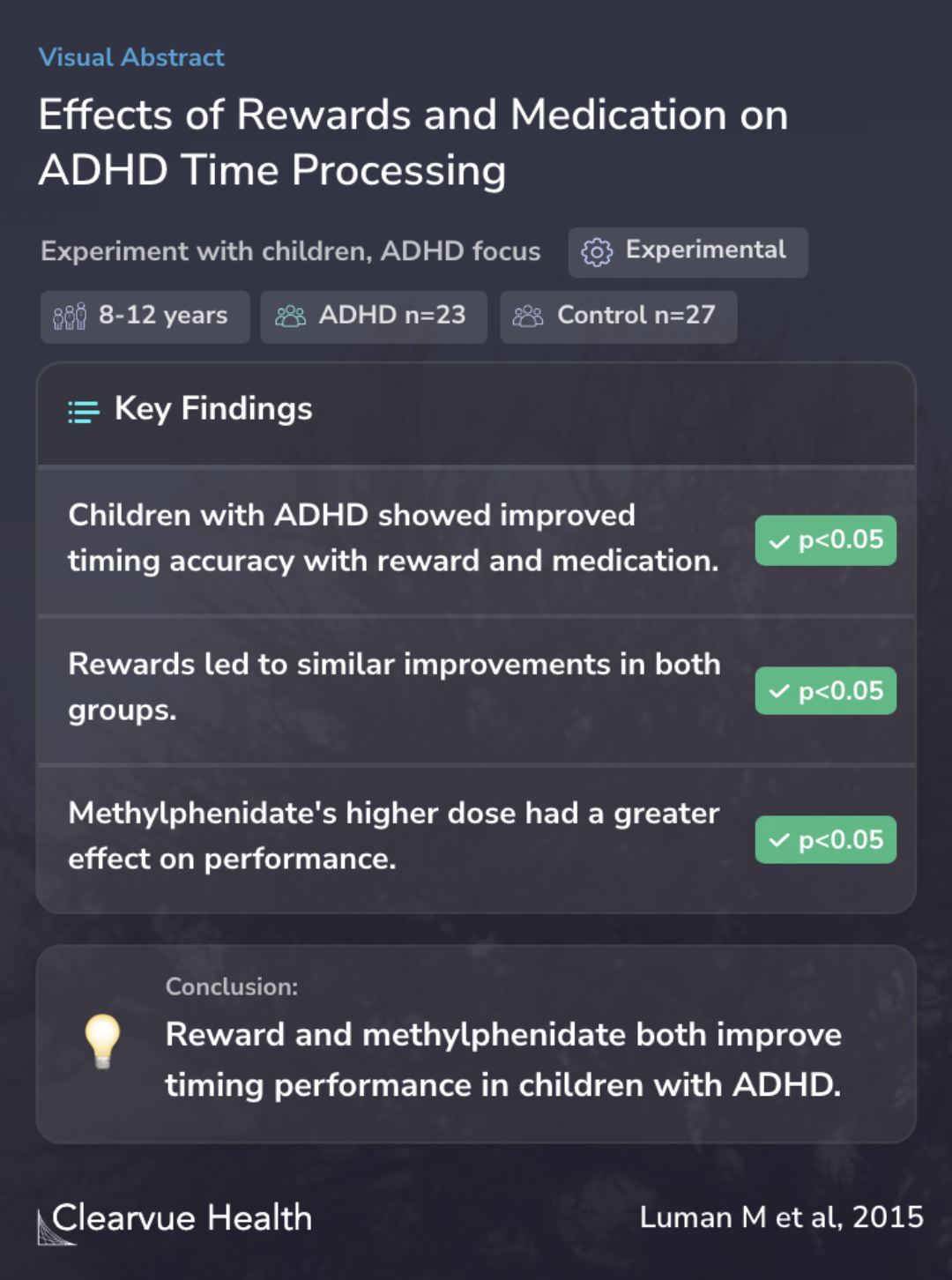The Unique and Combined Effects of Reinforcement and Methylphenidate on Temporal Information Processing in Attention-Deficit/Hyperactivity Disorder
Effects of Rewards and Medication on ADHD Time Processing
Luman M, Papanikolau A, Oosterlaan J

Objectives
The study under review aimed to explore how attention-deficit/hyperactivity disorder (ADHD) affects temporal information processing and reward sensitivity. The study's focus was to determine the unique and combined effects of reinforcement and medication on these aspects in children diagnosed with ADHD.
Temporal information processing and reward sensitivity are neurocognitive impairments key to attention-deficit/hyperactivity disorder (ADHD).
Methods
In this study, forty children, including 23 with ADHD and 27 typical controls, aged between 8 to 12 years, were observed. These children participated in a time production task under three different conditions: reward, response cost, and feedback only. The task was designed to examine the impact of both monetary reinforcement and methylphenidate (MPH), a medication commonly known as Ritalin, on their ability to process temporal information. The expectation was that both monetary reinforcement and MPH would help improve the deficits in temporal information processing found in children with ADHD, and the combined effect of these interventions would be the most beneficial.
The aim of this study was to examine the unique and combined impact of reinforcement and methylphenidate (MPH) on temporal information processing in children with ADHD. We predicted that both monetary reinforcement and MPH would ameliorate temporal information processing deficits in ADHD...
Results
At baseline, children with ADHD displayed challenges in internal clock functioning, as shown by their greater underestimations of the 1-second interval, and increased timing variability indicating poor motor output. Introducing reward and response costs improved motor output in both groups of children. Notably, methylphenidate enhanced performance, with higher doses showing greater effects. These findings were supported by medium to large effect sizes for reinforcement and medication. However, contrary to initial expectations, the combination of MPH and reinforcement did not show an additive effect.
Dependent variables were time production accuracy and variability. At baseline, children with ADHD displayed poor internal clock functioning compared with controls, as reflected by greater underestimations of the 1-second interval, and they showed poor motor output as reflected by increa...
Conclusions
The study concluded that both reward and methylphenidate independently improve timing performance in children with ADHD. This finding aligns with previous studies that have explored the impact of motivation and medication in managing ADHD symptoms.
The results of this study confirm the value of reward and response cost being similar to that of MPH to optimize (timing) performance of children with ADHD.
Key Takeaways
Context
The current study's findings are particularly relevant in the broader context of ADHD research. For example, Dovis et al.'s 2012 research demonstrated that motivational incentives like money and gaming improved working memory in children with ADHD. These findings are consistent with the current study's observation that reward can enhance cognitive performance in ADHD.
Similarly, Volkow et al.’s 2011 study, which identified motivation deficits in ADHD as linked to dysfunctions in the dopamine reward pathway, aligns with the current study's emphasis on the effectiveness of reward and medication. These parallel findings across different studies underscore the multifaceted approach needed in understanding and managing ADHD, highlighting the importance of both behavioral and pharmacological interventions.